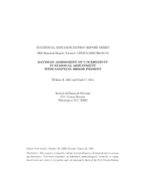Bayesian Assessment of Uncertainty in Seasonal Adjustment with Sampling Error Present
Bayesian Assessment of Uncertainty in Seasonal Adjustment with Sampling Error Present
Abstract
Seasonal adjustment of economic time series is subject to the following sources of error: nonsampling survey errors, sampling error, model uncertainty, parameter uncertainty, seasonal plus nonseasonal decomposition uncertainty, and inherent signal extraction error. While it is difficult to allow for nonsampling errors and model uncertainty, we develop Bayesian methods to allow for the contributions of the other four error sources in assessing uncertainty in seasonal adjustment. There are four elements to our approach. (1) We develop ARIMA time series models for the signal (true, unobserved series) and sampling error components of a time series. (2) We use the model-based framework of Hillmer and Tiao, and Burman, for decomposition of the signal model into seasonal and nonseasonal component models. (3) We treat the model in a Bayesian framework that facilitates the combining of information about the sampling error model available from estimated sampling error variances and covariances with the information contained in the observed time series data. (4) We use Monte Carlo integration to obtain posterior means and variances of the seasonal and nonseasonal components. Uncertainty about the seasonal plus nonseasonal decomposition is reflected by using a flat prior for a key parameter in the approach of Hillmer and Tiao, and Burman. Different values of this parameter lead to different seasonal and nonseasonal component models that are still consistent with the signal model, and hence with the model for the observed time series, so the data contain no information about this parameter. Comparing the posterior means and variances with those obtained conditional on the model parameters, or on the decomposition parameter, or both, provides an assessment of the contributions of parameter uncertainty and decomposition uncertainty to seasonal adjustment uncertainty.
We apply our methods to a Census Bureau time series of five or more unit housing starts in the South region of the U.S. For this series we find that posterior means of the seasonal and nonseasonal components are insensitive to parameter uncertainty, but are very sensitive to decomposition uncertainty. We also find that parameter uncertainty has a generally small effect on posterior variances, though the effects vary erratically over time. We find that decomposition uncertainty has a large effect on posterior variances. The general conclusion is that in seasonal adjustment, careful thought should be devoted to the decomposition assumptions, the assumptions made to yield models for the seasonal and nonseasonal components consistent with the signal model. The decomposition assumptions have a profound effect on the results, and the data carry no information to discriminate between alternative model decompositions that yield the same model for the observed data.




